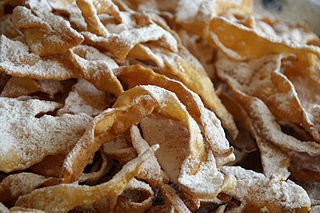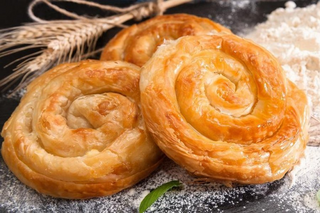
The cuisine of the American Midwest draws its culinary roots most significantly from the cuisines of Central, Northern and Eastern Europe, and Indigenous cuisine of the Americas, and is influenced by regionally and locally grown foodstuffs and cultural diversity.
Albanian cuisine is a representative of the cuisine of the Mediterranean. It is also an example of the Mediterranean diet based on the importance of olive oil, fruits, vegetables and fish. The cooking traditions of the Albanian people are diverse in consequence of the environmental factors that are more importantly suitable for the cultivation of nearly every kind of herbs, vegetables and fruits. Olive oil is the most ancient and commonly used vegetable fat in Albanian cooking, produced since antiquity throughout the country particularly along the coasts.

Meze is a selection of small dishes served as appetizers in Albanian, Bosnian, Armenian, Kurdish, Levantine, Turkish, Bulgarian, Greek. It is similar to Spanish tapas and Italian antipasti. A mezze may be served as a part of a multi-course meal or form a meal in itself. In non-Islamic countries, or in areas without alcohol restrictions, mezze are often served with spirits such as arak, rakia, raki, oghi or grappa.

Polish cuisine is a style of food preparation originating in and widely popular in Poland. Due to Poland's history, Polish cuisine has evolved over the centuries to be very eclectic, and shares many similarities with other national cuisines. Polish cooking in other cultures is often referred to as à la polonaise.

Angel wings are a traditional sweet crisp pastry made out of dough that has been shaped into thin twisted ribbons, deep-fried and sprinkled with powdered sugar. Common to many European cuisines, angel wings have been incorporated into other regional cuisines by immigrant populations. They are most commonly eaten in the period just before Lent, often during Carnival and on Fat Thursday, the last Thursday before Lent – not to be confused with "Fat Tuesday", the day before the start of Lent. There is a tradition in some countries for husbands to give angel wings to their wives on Friday the 13th in order to avoid bad luck.

Börek is a family of pastries or pies found in the Balkans, Middle East, Central Asia and South America. The pastry is made of a thin flaky dough such as filo with a variety of fillings, such as meat, cheese, spinach, or potatoes. Boreks are mainly associated with the Middle East, Caucasus, and also with the former Ottoman Empire, including the Balkans and the South Caucasus, Eastern European and Central European countries, Northern Africa and Central Asia. A borek may be prepared in a large pan and cut into portions after baking, or as individual pastries. They are usually baked but some varieties can be fried. Borek is sometimes sprinkled with sesame or nigella seeds, and it can be served hot or cold.

Israeli cuisine primarily comprises dishes brought from the Jewish diaspora, and has more recently been defined by the development of a notable fusion cuisine characterized by the mixing of Jewish cuisine and Arab cuisine. It also blends together the culinary traditions of the various diaspora groups, namely those of Middle Eastern Jews with roots in Southwest Asia and North Africa, Sephardi Jews from Iberia, and Ashkenazi Jews from Central and Eastern Europe.

Café liégeois is a French cold dessert made from lightly sweetened coffee, coffee-flavoured ice cream and Chantilly cream.

Cheburek are deep-fried turnovers with a filling of ground or minced meat and onions. A popular street dish, they are made with a single round piece of dough folded over the filling in a crescent shape. They have become widespread in the former Soviet-alligned countries of Eastern Europe in the 20th century.

Breaded cutlet or braised cutlet is a dish made from coating a cutlet of meat with breading or batter and either frying or baking it.

Middle Eastern cuisine or West Asian cuisine includes a number of cuisines from the Middle East. Common ingredients include olives and olive oil, pitas, honey, sesame seeds, dates, sumac, chickpeas, mint, rice and parsley, and popular dishes include kebabs, dolmas, falafel, baklava, yogurt, doner kebab, shawarma and mulukhiyah.
Breakfast, the first meal of the day eaten after waking from the night's sleep, varies in composition and tradition across the world.
This page is based on this
Wikipedia article Text is available under the
CC BY-SA 4.0 license; additional terms may apply.
Images, videos and audio are available under their respective licenses.










